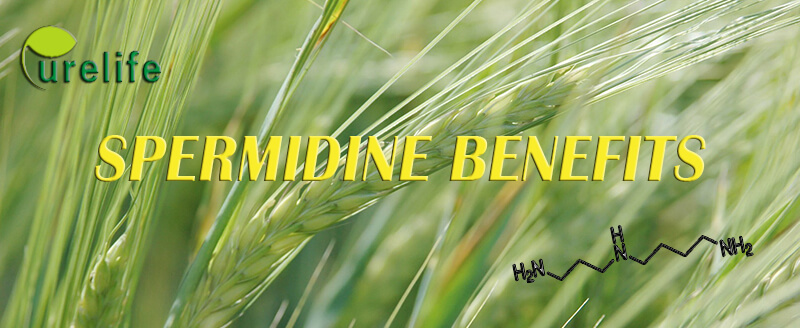Spermidine Benefits
What is Spermidine?
Product name: Spermidine, Spermidine-rich wheat germ extract
Other name: N-(3-Aminopropyl)-1,4-diaminobutane, Fermented wheat germ extract
CAS No.: 124-20-9
Appearance: White to Off-white powder
Molecular Formula: C7H22N3
Molecular Weight: 145.25

Spermidine, first isolated from semen or sperm, is a water-soluble a polyamine which is a natural component occurs naturally in all tissues of our human bodies and also found in many other organisms like animals, plants, and typical dietary foods. About one third of the spermidine levels in our body is produced by our own cells, the rest is absorbed through food and certain bacteria found in our digestive tract. A balanced diet can therefore help maintain high levels of spermidine. Then, what foods are rich in spermidine ?
The 10 most spermidine-rich foods
- Wheat germ 24,3mg/100g Spermidine
- Dried soybeans 20,7mg/100g Spermidine
- Cheddar (aged at least one year) 19,9mg/100g Spermidine
- Mushrooms 8,8mg/100g Spermidine
- Peas 6,5mg/100g Spermidine
- Rice bran 5mg/100g Spermidine
- Chicken liver 4,8mg/100g Spermidine
- Mango 3mg/100g Spermidine
- Chickpeas 2,9mg/100g Spermidine
- Cauliflower / Broccoli 2,5mg/100g Spermidine
How does Spermidine work?
Spermidine acts as a polyamine directly in the cells and enhances autophagy. Autophagy is a natural process in the human body and acts like a kind of recycling. The body breaks down unneeded and diseased cell components and reuses the components again. This leads to a rejuvenating effect on the cells. Let’s see what Spermidine Benefits is
Spermidine Benefits
Spermidine is one type of polyamine, which can interact with DNA and play roles in several cell functions such as protein synthesis, cell growth and how long cells live.
Fighting aging and extending lifespan
Spermidine counteracts aging and promotes longevity by inducing autophagy to facilitate the rejuvenation of cell constituents.
A study published in the American Journal of Clinical Nutrition in 2018, involving 829 participants aged 45 to 84 years, suggests a link between high spermidine intake and lower mortality. Since 1995, participants have been prescribed diets with various spermidine-rich foods. In later controls, it was found that participants in the study who consumed spermidine-rich foods lived longer on average.
“The difference in mortality risk between the upper and lower thirds of spermidine intake was similar to that of a person 5.7 years younger on average. Our results support the concept of epidemiological evidence that a spermidine-rich diet is associated with an increased survival rate in humans. “
Supports cognitive health
Researchers at the University of Graz in Austria published a study that found mitochondria to be a key element in cognitive function, given that dysfunctional mitochondria is linked to age-related memory impairments.
Mitochondria are vital to cellular respiration that enable cells to be healthy throughout the body and brain. Throughout life, mitochondrial quality is controlled by autophagy, but like a lot of things, the machinery that controls autophagy declines as we get older, leading to an unhealthy proliferation of weak or senescent brain cells. Spermidine improves cognitive function, largely due to its ability to promote autophagy, as spermidine increases autophagy directly and results in extending lifespan.
Spermidine has a neuroprotective effect against neuron damages caused by inflammation, oxidative stress, and ischemia. This assists in the prevention of age-related neurodegenerative diseases such as Parkinson’s and Alzheimer’s disease. Another study shown that spermidine was associated with a positive impact on memory performance in older adults with subject cognitive decline. The beneficial effect might be mediated by stimulation of neuromodulatory actions in the memory system.
Supports cardiovascular health
Spermidine from food sources has been shown to bring out cardioprotective effects through autophagy, according to studies in rats, mice, and humans demonstrating reduced hypertension and arterial aging. Similarly, increased spermidine intake is associated with reduced blood pressure and lower risk of cardiovascular disease, leading to lower mortality in humans.
Promotes Hair Growth
Spermidine has been shown in studies to lengthen and strengthen hair and keep it in the growth (anagen) phase for longer by upregulating the expression of Keratin 1 , wheat-derived polyamines accelerate the synthesis of proteins and nucleic acid and help the regeneration of nails and hair.
Is Spermidine safe?
There is no known side effects of taking Spermidine supplements. Furthermore, the natural spermidine, as known as permidine rich wheat germ extract has GRAS by FDA , and is approved as a novel food in EU as well .
But if you are allergic to wheat or gluten, please consult your doctor before you take wheat germ extract 1% spermidine, because this ingredient contains wheat and gluten
Spermidine recommended dosage
Spermidine is a relatively new supplement on the market, there is no a recommended dosage. But as per the formulas that is already on the market, the dosage for the pure spermidine should be 2-12mg daily .
Where to buy Spermidine raw material?
Purelife bio supplies spermidine raw powder with the following two specifications:
.Spermidine 98% (Synthetic, CAS No 334-50-9)
.Fermented wheat germ extract 1% spermidine (Natural, CAS No: 124-20-9)
Both are in stock all the time, if any product info you need, such as specification sheet, COA, pricing quotation and test spectrum , welcome to contact us for details .


